5 Best Weight Loss Diet Plans for Women

Choosing the right diet plan is crucial for effective weight loss, especially for women who face unique challenges such as hormonal changes and different life stages. This article covers the basics of weight loss, explores 5 best weight loss diet plans for women, and offers a sustainable, holistic approach to weight management.
To lose weight, you need to consume fewer calories than you burn. It’s that simple! But remember to balance proteins, fats, and carbohydrates to stay energized and maintain muscle. Also, drink plenty of water—it boosts your metabolism and helps control your appetite. Knowing these basics is essential for finding the right weight-loss diet for women.
5 Best Weight Loss Diet Plans for Women
Mediterranean Diet for Weight Loss
The Mediterranean diet is one of the most beloved and well-researched diet plans, celebrated for its health benefits and delicious, satisfying meals. This diet emphasizes whole, minimally processed foods, healthy fats, and lean proteins, making it a fantastic option for weight loss and overall health improvement.
Key Components:
Fruits and Vegetables: To obtain a diversity of nutrients, go for a variety of colors.
Whole Grains: Foods like quinoa, barley, and whole wheat.
Healthy Fats: Olive oil, nuts, and seeds.
Lean Proteins: Fish, chicken, and legumes.
Moderate Dairy: Cheese and yogurt.
Limited Red Meat: Only occasionally.
Benefits:
- This diet promotes heart health by incorporating heart-friendly foods.
- It offers anti-inflammatory effects, helping to reduce inflammation in the body.
- It is rich in antioxidants, which help combat oxidative stress and promote overall health.
- It is pleasant and sustainable, which makes it simpler to maintain over time.
Sample Meal Plan:
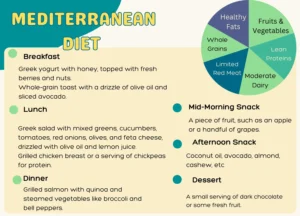
A recipe guide for Grilled Salmon with quinoa.
Keto Diet for Women
The Keto diet focuses on high-fat, low-carb foods that can help you lose weight quickly by inducing a state of ketosis, where your body burns fat for fuel instead of carbohydrates. This diet is known for its rapid weight loss effects but can be restrictive.
Key Components:
High Fat: Avocados, cheese, nuts, and seeds.
Moderate Protein: Meat, fish, and eggs.
Very Low Carbs: Mainly non-starchy vegetables like leafy greens.
Benefits:
- The keto diet can lead to quick weight loss by forcing the body to burn fat for fuel instead of carbohydrates.
- Many women find that the keto diet helps reduce their appetite, making it easier to consume fewer calories.
- The keto diet can help stabilize blood sugar levels, which is beneficial for overall health and managing conditions like diabetes.
Sample Meal Plan:
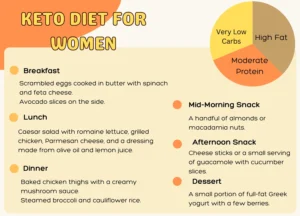
A recipe guide for Baked chicken thighs with cream of mushroom soup.
Intermittent Fasting for Women’s Weight Loss
Intermittent fasting involves alternating cycles of eating and fasting. Common methods include the 16/8 method (16 hours fasting, 8 hours eating window) or the 5:2 method (normal eating for 5 days, restricted calories for 2 days). This approach can improve metabolism and is relatively easy to follow once you get used to it.
Key Components:
Fasting Periods: No food consumption during fasting periods, only water, tea, or coffee.
Eating Windows: Focus on nutrient-dense foods during eating periods.
Benefits:
- Intermittent fasting can boost metabolism, helping your body burn calories more efficiently.
- This approach to eating is easy to follow and can be adapted to fit your lifestyle and preferences.
- Intermittent fasting can promote fat loss and improve your body’s sensitivity to insulin, reducing the risk of type 2 diabetes.
Sample Meal Plan (16/8 method):
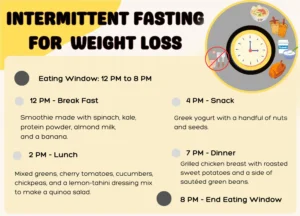
Plant-Based Diet for Weight Loss
A plant-based diet is rich in fruits, vegetables, legumes, and whole grains. It’s packed with fiber and nutrients, making it great for overall health and weight loss. This diet minimizes or eliminates animal products, focusing instead on various plant foods.
Key Components:
Fruits and Vegetables: The more, the better.
Whole Grains: Brown rice, quinoa, oats.
Legumes: Beans, lentils, chickpeas.
Nuts and Seeds: Almonds, chia seeds, flaxseeds.
Minimal Animal Products: Optional and limited.
Benefits:
- A plant-based diet is rich in fiber, which aids in digestion and helps you feel full, making it easier to manage your weight.
- This diet includes a variety of fruits, vegetables, legumes, and whole grains, providing a wide array of essential nutrients for overall health.
- A plant-based diet can reduce the risk of chronic diseases such as heart disease, diabetes, and certain cancers.
Sample Meal Plan:
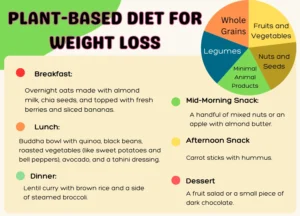
A recipe guide for Lentil Curry with brown rice.
DASH Diet for Weight Loss
The DASH (Dietary Approaches to Stop Hypertension) diet aims to lower blood pressure and promote heart health through a balanced intake of nutrients. It includes a variety of foods rich in potassium, calcium, and magnesium.
Key Components:
Fruits and Vegetables: High intake.
Whole Grains: Whole wheat, oats, barley.
Lean Proteins: Poultry, fish, beans.
Low-Fat Dairy: Milk, yogurt, cheese.
Limited Salt: Reduce sodium intake.
Benefits:
- The DASH diet is designed to reduce blood pressure by encouraging the consumption of fruits, vegetables, whole grains, and lean proteins while limiting salt intake.
- The DASH diet helps improve overall cardiovascular health.
- The diet promotes a wide range of nutrient-rich foods, ensuring a balanced intake of essential vitamins and minerals.
Sample Meal Plan:
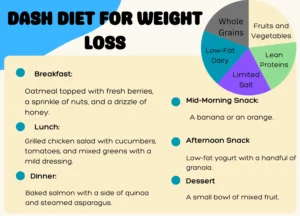
These diet plans cater to various tastes and lifestyles. Whether you’re looking to lose weight or maintain a healthy diet, there’s an option for everyone. The key is to find what works best for you and stick with it long-term.
Also read: Flat Stomach 7-Day Diet Plan for Weight Loss.
Leading Your Weight Loss Journey
- Role of Physical Activity: Combining your diet with regular exercise can speed up weight loss and boost overall fitness. Including both strength training and cardio exercises in your routine is especially effective. A balanced approach that integrates a healthy diet with consistent physical activity is essential for achieving lasting results.
- Addressing Emotional and Mental Health: Weight loss isn’t just about what you eat and how much you exercise; managing stress and emotional eating is also important. Practices like mindfulness, stress management techniques, and having a strong support system can keep you motivated and help prevent setbacks. Taking care of your emotional and mental health is crucial for long-term success.
- Consulting Professionals: Getting advice from healthcare providers, dietitians, or nutritionists can be very helpful on your weight loss journey. These experts can offer personalized advice and create diet plans tailored to your health needs. Consulting professionals ensure you’re making safe and effective choices for your body.
- Safety Concerns: Prioritizing safety is important when starting a weight loss plan. Avoid extreme diets that promise quick results but can harm your health over time. Instead, focus on safe, sustainable weight loss diets that prioritize your overall health and well-being. Always consult a healthcare provider before trying supplements to ensure they’re safe.
- Resources and Tools: Utilize reputable resources and tools to support your weight loss efforts. Websites, books, and apps can provide valuable information, tips, and motivation. Tools like calorie counters, meal planners, and fitness trackers can help you monitor your progress and stay on track toward your goals. Using these resources can make your weight loss journey more manageable and successful.
Designing a Personalized Diet Plan
Everyone has different tastes and lifestyle factors that influence their diet. It’s crucial to create a plan that you enjoy and can stick to long-term. Your daily schedule, activity level, and even work environment can impact how and when you eat. Tailor your diet plan to fit seamlessly into your life.
Make meal plans that consider any special dietary requirements you may have. Completely cutting out your favorite foods can lead to feelings of deprivation and may result in binge eating. Incorporate small portions of your favorite foods into your diet plan, balancing them with healthier options to maintain overall nutritional balance.
Set aside time each week to plan your meals. Consider your schedule and choose recipes that can prepared quickly on busy days. Make a detailed shopping list based on your meal plan and stick to it, to avoid buying unnecessary items that could ruin your diet.
Prepare as much as possible in advance. Chop vegetables, cook grains, and portion out snacks to streamline meal preparation during the week.
Conclusion
Finding the right weight loss plan means knowing what your body needs and sticking to a healthy, long-lasting strategy. Always find what suits you, whether it’s the Mediterranean diet, Keto diet, intermittent fasting, plant-based eating, or DASH diet. Check out our website for more advice, tools, and encouragement to reach your weight loss goals and stay healthy.
Frequently Asked Questions (FAQs)
How do I know which weight loss diet plan is best for me?
Choosing the right weight loss diet plan depends on various factors such as your personal preferences, dietary restrictions, health goals, and lifestyle. It’s essential to consult with a healthcare provider or nutritionist to determine the most suitable plan for your individual needs.
Will I need to exercise while following these diet plans?
While diet plays a significant role in weight loss, regular physical activity can enhance results and improve overall fitness. Both diet and exercise are essential components of a successful weight loss journey.
Are these diet plans safe for pregnant or breastfeeding women?
Some of the diet plans mentioned may not be suitable for pregnant or breastfeeding women due to their restrictive nature. Pregnant or breastfeeding mothers should prioritize nutritious foods and consult a healthcare provider before making dietary changes.
How can I manage cravings and emotional eating while on a weight loss journey?
Managing cravings and emotional eating requires a combination of strategies, including mindfulness techniques, stress management, and seeking support from friends, family, or a healthcare professional. Identifying triggers and finding healthier ways to cope can help overcome these challenges.
What should I do if I hit a weight loss plateau?
Weight loss plateaus are common and frustrating, but they’re also an opportunity to reassess your approach and make necessary adjustments. Experimenting with different meal plans, increasing physical activity, and focusing on non-scale victories can help to break plateaus and continue progressing toward your goals.
Are supplements necessary for weight loss?
While some supplements may support weight loss efforts they’re not a substitute for a balanced diet and regular exercise. It’s essential to prioritize whole foods and consult a healthcare provider before taking any supplements to ensure they’re safe and appropriate for individual needs.
How can I stay motivated throughout my weight loss journey?
Staying motivated requires setting realistic goals, tracking progress, celebrating achievements, and surrounding yourself with a supportive environment. Engaging in activities you enjoy, seeking inspiration from success stories, and reminding yourself of your reasons for wanting to lose weight can also help maintain motivation.





